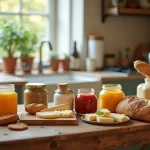The Role of Sustainability in Modern UK Kitchen Design
Sustainability is at the heart of modern UK kitchen design, driving a profound shift in how kitchens are conceptualised and constructed. Central to sustainable kitchen design UK is the integration of eco-friendly kitchen trends that prioritize reducing environmental impact without sacrificing style or functionality. Designers now focus heavily on sustainable materials such as bamboo, reclaimed wood, low-VOC paints, and recycled metals, which offer durability alongside reduced carbon footprints.
A key aspect of eco-conscious kitchen design involves responsible sourcing. Materials must not only be environmentally friendly but also sourced ethically to minimize harm to ecosystems and communities. Consumers increasingly demand transparency regarding the origin and environmental credentials of products used in their kitchens, influencing manufacturers to innovate greener solutions.
Also read : The Ultimate Kitchen Fire Extinguisher Selection Guide: Ensure Top-notch Fire Safety
These evolving demands have accelerated green innovation, making sustainability a core priority rather than an optional feature. From choosing airtight cabinetry that improves energy efficiency to incorporating renewable energy sources, the kitchen space is transformed into a model of ecological mindfulness. Sustainable kitchen design UK thus represents a balance among aesthetics, ethics, and practicality, setting new standards for environmentally responsible living spaces.
The Role of Sustainability in Modern UK Kitchen Design
Sustainable kitchen design UK today hinges on adopting eco-friendly kitchen trends that not only reduce environmental harm but also elevate practical living. Central to this transformation is the integration of sustainable materials such as bamboo, reclaimed wood, and recycled metals, which offer durability while cutting down on resource depletion. These materials also embody responsible sourcing, ensuring that ecological footprints are minimized from production to installation.
Topic to read : How Are UK Kitchens Adapting to Emerging Culinary Trends?
Consumer demand remains a powerful driver of green innovation in the kitchen sector. More homeowners seek products verified for their eco-friendly attributes, prompting manufacturers to innovate continually. This has led to increased availability of low-VOC paints and energy-efficient cabinetry options that improve insulation and reduce energy use, reinforcing sustainability without compromising on kitchen aesthetics.
Moreover, the emphasis on sustainable kitchen design UK encourages the circular economy concept by integrating recycled and upcycled components. This approach optimizes resource use and waste reduction, aligning with broader environmental goals. Together, these eco-conscious choices define a kitchen space where style, responsibility, and functionality coexist seamlessly, mapping a clear path forward for modern UK homes.
The Role of Sustainability in Modern UK Kitchen Design
Sustainable kitchen design UK today embraces transformative practices that blend function and responsibility. One key development is the widespread adoption of sustainable materials, including bamboo, reclaimed wood, and recycled metals, which are chosen not only for durability but also for reducing environmental footprints. The integration of these eco-friendly kitchen trends emphasizes responsible sourcing protocols, ensuring materials come from ethically managed resources, limiting harm to ecosystems.
Consumer demand prominently drives this green innovation. Homeowners increasingly prioritise kitchens equipped with low-carbon options, prompting designers and manufacturers to advance eco-conscious products and solutions. This shift includes everything from energy-efficient appliances to cabinetry that improves insulation and reduces heat loss, aligning with broader sustainability goals.
These trends collectively elevate kitchen design sustainability, where every choice—from surface finishes to hardware—reflects environmental mindfulness. The rise of circular economy principles further influences the sector, as recycled and upcycled materials gain prominence. By focusing on these areas, sustainable kitchen design UK not only minimizes ecological impact but also fosters a new standard of responsible luxury in modern homes.
The Role of Sustainability in Modern UK Kitchen Design
Modern sustainable kitchen design UK revolves around integrating eco-friendly kitchen trends that redefine both form and function. A standout feature is the emphasis on sustainable materials—including bamboo, reclaimed wood, and recycled metals—that offer durability while reducing environmental impact. These materials must also be responsibly sourced, ensuring that their extraction and processing limit ecological damage.
Consumer awareness increasingly shapes this shift. Homeowners actively seek products aligned with sustainability principles, driving manufacturers toward innovative eco-conscious designs. For example, the demand for low-VOC paints and energy-efficient cabinetry promotes greener choices without sacrificing aesthetic quality.
Furthermore, eco-friendly kitchen trends encourage embracing a circular economy mindset. Recycled components and upcycled materials are integrated thoughtfully, minimizing waste and extending product lifecycles. This is critical in a sector traditionally driven by constant updates and renovations.
In sum, sustainable kitchen design UK today isn’t just about materials but about a comprehensive approach. It combines innovation, responsibility, and style, meeting consumer demand while significantly reducing environmental footprints through these evolving design practices.
The Role of Sustainability in Modern UK Kitchen Design
Contemporary sustainable kitchen design UK increasingly incorporates eco-friendly kitchen trends that elevate both environmental responsibility and user experience. Central to this approach is the selection of sustainable materials such as bamboo, reclaimed woods, and recycled metals, which significantly reduce the ecological footprint during production and installation. These materials’ durability also contributes to long-lasting kitchen solutions, lessening waste generated by frequent renovations.
Consumers’ heightened environmental awareness heavily influences green innovation. Rising demand for transparency about material sourcing and product sustainability pushes manufacturers and designers alike to prioritise responsible procurement. This ensures that every component is ethically sourced, minimising ecosystem disruption and promoting fair labour practices.
Furthermore, integration of eco-friendly kitchen trends includes selecting finishes and paints with low volatile organic compounds (VOCs), which improve indoor air quality and contribute to healthier living spaces. Energy-efficient cabinetry designed to enhance insulation also plays a pivotal role, reducing heating energy use and thus the kitchen’s carbon footprint.
Through these interconnected practices, sustainable kitchen design UK balances innovative functionality, ethical responsibility, and aesthetic appeal, setting new industry benchmarks.


